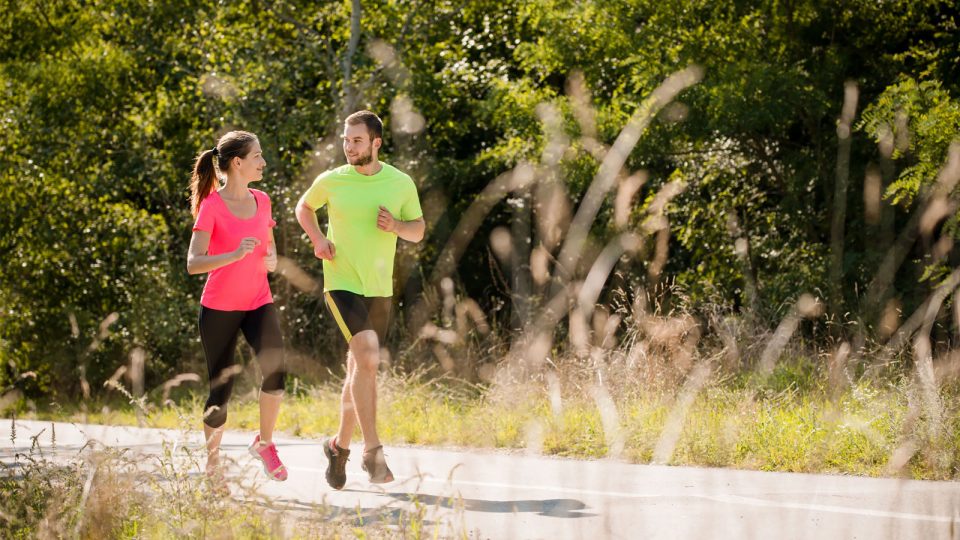Did you know that your brain is wired to reward you when you talk about yourself? It’s true, according to Harvard University psychologists who study such things. Humans are, after all, social animals and we use words in every aspect of our lives.
In a given day, most people devote 60-percent of their conversation time to themselves, and talk about themselves up to 80-percent of the time on social media! But here’s a surprise: when you stop talking and become silent, you become empowered and are more likely to speak the truth when you begin talking again.
Remember this next time there’s a weighty silence during your next chat!
Why Do Runners Talk About Themselves?
Since some of the reasons runners talk is just biology, what else fuels your propensity for focusing on yourself? It could be the way you were raised. If your parents admonished you about blabbing too much when you were a kid, growing up may be your excuse to do that frequently without being told to sit down and shut up. On the other hand, if you were a timid child, maybe you’re just making up for lost time!

Runners are naturally competitive. It feels natural to discuss commonalities and disparities between yourself and those who share your passion. Talking about yourself gives you excuses to vent feelings or express frustration after a lousy finish.
Maybe you use your own experiences to inspire someone else or you are so overjoyed, you can’t stop applauding a recent medal or personal best. You’re only doing what comes naturally.
Can bragging turn you into a bore? It’s possible. But not likely if you break up your brags with talk that addresses other people’s concerns, interests and dreams. If you ask how the other person is doing, how they fared at the finish line, what plans they have for upcoming marathons and especially whether they are willing to share tips about becoming a better runner, they may not even notice if you spend half of your conversation time talking about yourself.
What Do Runners Talk About?
On her “Run, Selfie, Repeat” blog, Kelly Roberts questions fellow runners about the topics that arise most often when two runners converse and these eight top her list:
- Runners talk about their pace. She claims pace is “how runners size each other up.”
- A runner wouldn’t be a runner if he didn’t discuss how far he runs each day.
- Reciprocity is fair play, so asking “How far do you run?” is the next common subject.
- Runners talk a lot about poop. When, where and how are popular themes!
- Runners love to discuss what they like to eat and drink before and after they run.
- The topic of bedtimes for runners who get up at the crack of dawn is also a hot one.
- Shared tales about running injuries are next on conversation-starter lists.
- And every runner loves to share how and why he or she got into this sport.
Do You Trash Talk?
Author Shaun Powell was curious about how trash talk came about, so he conducted research on the subject and learned that while athletes are considered innovators of trash talk (surpassing rappers and hip hop artists), sports historians credit the iconic fighter Muhammad Ali with its origin in 1965.

Hoping to get the psychological drop on opponent Sonny Liston and intimidate him, the late boxer launched tirades to humiliate Liston before they fought, the most legendary of which was captured for posterity by a “Sports Illustrated” photographer.
But, we believe that “Psychology Today” writer Jason Silverman got it right when he wrote that the first example of trash talk was David vanquishing Goliath with a sling shot in the Bible after threatening to strike him down and cut off his head!
These days, trash talk has spread like octopus tentacles. Footballers, tennis players, skiers, basketball players and runners, all eager to get a psychological edge, aren’t shy about getting inside the heads of other athletes before they meet on the playing field.
Do You Use Social Media To Trash Competitors?
Trash talking competitors before races has become commonplace. Athletes hoping to disarm one opponent or an entire team use social media to do the job most often. The issue has drawn so much attention of late, U.S. coaches are urging players to cut it out and focus on their sport.

How serious have things gotten? Some coaches monitor Twitter, Instagram, Snapchat, Facebook and other sites (with parental approval). If they catch athletes trash talking, there’s a price to pay.
If the urge to use social media to denegrade a fellow runner has tempted you – or if you have indeed posted trash, you’re going to have to learn to police yourself and perhaps the people with whom you most often communicate. You may already have learned that gratification connected to trash talk is momentary and not terribly satisfying and it can come back to bite you.
Further, this sort of behaviour not only unfairly targets individuals but it can impact the morale of teams, clubs and events due to the demoralising tone of such communications.
How To Promote Yourself In A Positive Way
You’ve earned so many medals, you’ve run out of wall space. Your folks have practically re-decorated their homes with your trophies.

The urge to brag about accomplishments is nothing to be ashamed of, but sociologists say that it’s not what you say but how you say it that’s at the heart of subtle self-promotion, and these tips can help:
- Use your Facebook page to publicise your accomplishments in self-deprecating ways that disguise your ego.
- Understand that conceit isn’t a negative term; it’s okay to spread the word about your wins.
- Balance good news with bad. There’s nothing wrong with talking about your losses. They show that you’re human!
- Practice reciprocity. Post news about other people’s victories to balance those you post about yourself. Don’t be surprised if they return the favour setting up what marketers call a social media alliance.
- Make it a point to let others share in your success by mentioning the folks who never stop believing in you.
- Start a blog that offers opportunities to wax poetic about marathons you run, charities you support and your love of running!
What is your best advice to runners who spend so much time talking about themselves and their accomplishments that you can’t get a word in edgewise?




